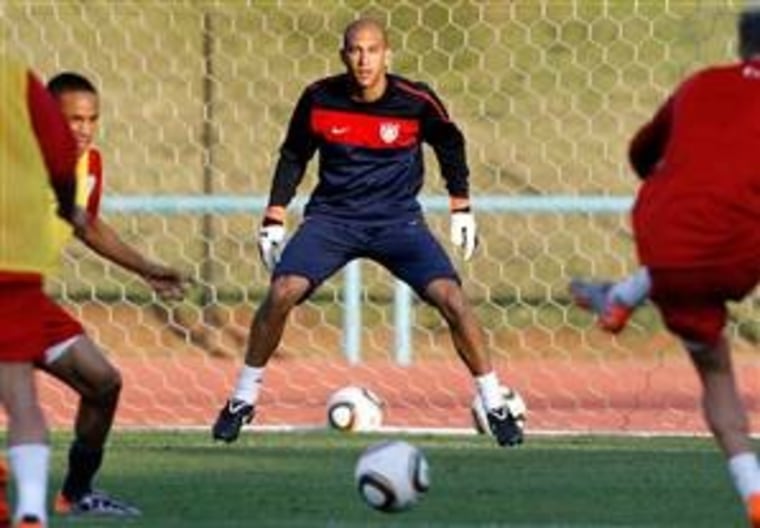Until July 11, when the World Cup ends, more Americans than usual will pretend to be knowledgeable about all things soccer. For casual futbol fans, here’s an intriguing did-you-know to pull out during tomorrow’s early game, when the U.S. takes on Slovenia: Did you know Tim Howard, the U.S. goalie, has Tourette syndrome? Howard’s tics – coughs, throat clearing and facial grimaces – are noticeable in interviews, but on the field, his symptoms almost completely disappear. It’s a phenomenon that can sometimes happen to people with Tourette’s during moments of intense focus. “There’s actually a lot of individuals with Tourette’s syndrome that tell us when they are concentrating on a coordinated motor activity, their tics either disappear or markedly diminish,” says Dr. Robert King, medical director of the Tourette’s/OCD Clinic at the Yale Child Study Center at the Yale University School of Medicine. “You’ll hear this from musicians as well.” When the brain focuses on a certain set of repetitive movements, it may be inhibiting the firing of other neurons – say, those that cause tics associated with Tourette’s, he explains. Culturally, Tourette’s is widely misunderstood, King says. Remember that episode of “Curb Your Enthusiasm,” where the opening night of a new restaurant is nearly ruined when Larry David hires a chef with Tourette’s, who involuntarily shrieks obscenities? Yeah, in most cases, Tourette’s is nothing like that. That shouting-curse-words condition is called coprolalia, and while it may be the most famous symptom associated with Tourette’s, only about 10 percent of Tourette’s patients actually exhibit those symptoms, according to the Tourette Syndrome Association. Still, when Howard joined the English team Manchester United in 2003, some U.K. newspapers actually used the words “handicapped” and “retarded” to describe him – one publication even called him the team’s “swearing savior,” an alliterative reference to coprolalia, a symptom Howard does not have. The most common tics are eye blinking, coughing, throat clearing, sniffing and facial movements. About 200,000 Americans have Tourette’s, and as many as one in 100 may have a milder form of the disorder, according to the Centers for Disease Control. While it’s not known exactly what causes Tourette’s, research suggests that certain chemicals in the brain that transmit information, such as dopamine and serotonin, may be to blame. There may also be a genetic link. Howard, 31, has said that his condition may actually help his game, because it forces him to be more alert and reactive, and research seems to back his opinion. One study from the late 1990s found that children with Tourette’s are faster at completing timed motor coordination skills. “Some people (with Tourette’s), as a tic, have this thing called echopraxia, where they repeat, compulsively, a gesture others make,” King says. It could be that some people with Tourette’s are actually neurologically wired to be attuned to other people’s movements on a deeper level than most – something that could help when facing a penalty kick, when a goalkeeper has to decide within milliseconds whether to throw himself to the right or to the left to block the shot. Have you struggled with tics, as a child or as an adult? Tell us about your experiences in the comments. To read more Body Odd posts, click here. You can also find us on Twitter and on Facebook.
U.S. goalie shuts out Tourette's symptoms
